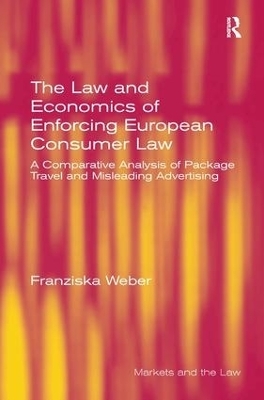
The Law and Economics of Enforcing European Consumer Law
A Comparative Analysis of Package Travel and Misleading Advertising
Seiten
2014
Routledge (Verlag)
978-1-4724-1704-6 (ISBN)
Routledge (Verlag)
978-1-4724-1704-6 (ISBN)
This book offers a comparative law and economics analysis of the changing landscape of EU consumer law enforcement policy now that EU member states are moving away from purely public or private law enforcement towards a more mixed approach.
In the internet age, the need for effective consumer law enforcement has arguably never been greater. This timely book is a comparative law and economic analysis of the changing landscape of EU consumer law enforcement policy. EU member states are moving away from purely public or private law enforcement and now appear to be moving towards a more mixed approach, not least due to European legislation. This book reflects on the need for and creation of efficient enforcement designs. It examines the various economic factors according to which the efficiency of different enforcement mechanisms can be assessed. Hypothetical case scenarios within package travel and misleading advertising, dealing with substantial individual harm and trifling and widespread harm are used to illustrate various consumer law problems. Design suggestions on how to optimally mix enforcement mechanisms for these case scenarios are developed. The findings are then used as a benchmark to assess real life situations in countries with different enforcement traditions - the Netherlands, Sweden and England. The book is of value to both researchers and policy-makers working in the area of consumer protection.
In the internet age, the need for effective consumer law enforcement has arguably never been greater. This timely book is a comparative law and economic analysis of the changing landscape of EU consumer law enforcement policy. EU member states are moving away from purely public or private law enforcement and now appear to be moving towards a more mixed approach, not least due to European legislation. This book reflects on the need for and creation of efficient enforcement designs. It examines the various economic factors according to which the efficiency of different enforcement mechanisms can be assessed. Hypothetical case scenarios within package travel and misleading advertising, dealing with substantial individual harm and trifling and widespread harm are used to illustrate various consumer law problems. Design suggestions on how to optimally mix enforcement mechanisms for these case scenarios are developed. The findings are then used as a benchmark to assess real life situations in countries with different enforcement traditions - the Netherlands, Sweden and England. The book is of value to both researchers and policy-makers working in the area of consumer protection.
Jun. Prof. Dr. Franziska Weber is Junior Professor for Civil Law and Law and Economics at the University of Hamburg, Germany.
Preface; Chapter 1 Introduction; Part 1 Optimal Enforcement Mixes (Analysis); Chapter 2 Existing Enforcement Mechanisms; Chapter 3 Framework to Assess Enforcement Designs; Chapter 4 Assessing Strengths and Weaknesses of Existing Law Enforcement Systems; Chapter 5 Combining Enforcement Mechanisms Efficiently for Specific Case Scenarios; Part 2 Country Studies (Comparison); Chapter 6 The Netherlands; Chapter 7 Sweden; Chapter 8 England; Part 3 Conclusions; Chapter 9 Conclusions;
| Erscheint lt. Verlag | 22.5.2014 |
|---|---|
| Reihe/Serie | Markets and the Law |
| Verlagsort | London |
| Sprache | englisch |
| Maße | 156 x 234 mm |
| Gewicht | 725 g |
| Themenwelt | Recht / Steuern ► Allgemeines / Lexika |
| Recht / Steuern ► EU / Internationales Recht | |
| Recht / Steuern ► Wirtschaftsrecht ► Handelsrecht | |
| ISBN-10 | 1-4724-1704-6 / 1472417046 |
| ISBN-13 | 978-1-4724-1704-6 / 9781472417046 |
| Zustand | Neuware |
| Haben Sie eine Frage zum Produkt? |
Mehr entdecken
aus dem Bereich
aus dem Bereich
mit Einführungsgesetz, Publizitätsgesetz und …
Buch | Softcover (2024)
dtv Verlagsgesellschaft
CHF 15,25


